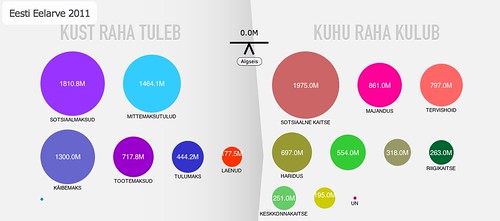The following guest post is by Tanel Kärp from the Estonian Academy of Arts. He’s a member of the OKF’s Working Group on Open Government Data.
MeieRaha.eu (OurMoney) is the first interactive visualization of the Estonian budget which was initiated and built during 48 hours at a local hackathon called Garage48 for Public Services.
The application is somewhat similar to others of its kind, with one major difference. Mainly because of joining the Eurozone at the start of 2011, the budget balance has been an extremely important factor to Estonians, so the MeieRaha emphasizes that by visualizing income and expenditure side by side. The idea is to offer the citizens a chance to play around, for example, with the income tax, and see how it actually affects spending in different areas. So it’s not only about showing the numbers, but also about explaining the sophisticated mechanics behind the budget the simplest way possible. This way the application could be a valuable educational tool, as well a measure to expose politicians’ populistic pre-election promises that “we’re going to lower taxes and raise salaries!”.
The Data
Data behind the visualization is currently scraped from various resources, from government-published PDFs and text files which accompany the state budget, mostly explaining where the money goes. This data hasn’t been published in any machine readable form yet.
The data which we scraped is mostly published at: http://meieraha.eu/en/data.html.
The Future
The MeieRaha team is currently working on launching an English version of the site and have also made a connection with the local Ministry of Finance, with whom we’re trying to collaborate to take the project further. Reaction so far has been very positive. There are definite plans to enhance the application both in terms of content and features, and of course rethink the interaction, visuals and programming which were quickly put together in less than 48 hours and are currently still very much work in progress.
Open Data in Estonia?
Estonia has been in the forefront in terms of adapting new IT developments. For over a decade, citizens have been using on-line services for all banking business and for communications with the state. Nowadays it’s normal to park one’s car using a cellphone, and one-third of the nation’s population can be found on Facebook.
All this progress has ironically become the reason why there has so far been little progress in terms of Open Data. Estonian government institutions have adopted the attitude of providing all the services by themselves, thus “eliminating” the need for opening up data for others to build applications on it.
The situation started to change in the end of 2010, when a group of activists — largely inspired by the OKFN OGD Camp held in London — gathered under the title of the Estonian Open Data Community and started organizing meetings between activists and government personnel who could have a say in developing the open data mindset locally.
The theme made its way to the general consciousness at the Garage48 Public Services hackathon mentioned above, as the lack of data to be used for projects such as MeieRaha caused a small outrage by the hacktivists present at the Garage. The message was carried by many prominent bloggers and also made it to the national TV’s evening news.
Currently, the Ministry of Economic Affairs and Communications has made the development of Open Data principles one of its main focuses. At this very moment, the needed projects and bills to be presented to the government are in development. Also in the making are addresses and instructions to government institutions on why and how to make their data public.
That’s a long way to come in just a few months and we hope to see the first results in the near future. We have also just launched an English version of www.opendata.ee, where you can keep yourself up to date with the latest local developments.
Theodora is press officer at the Open Knowledge Foundation, based in London. Get in touch via press@okfn.org









